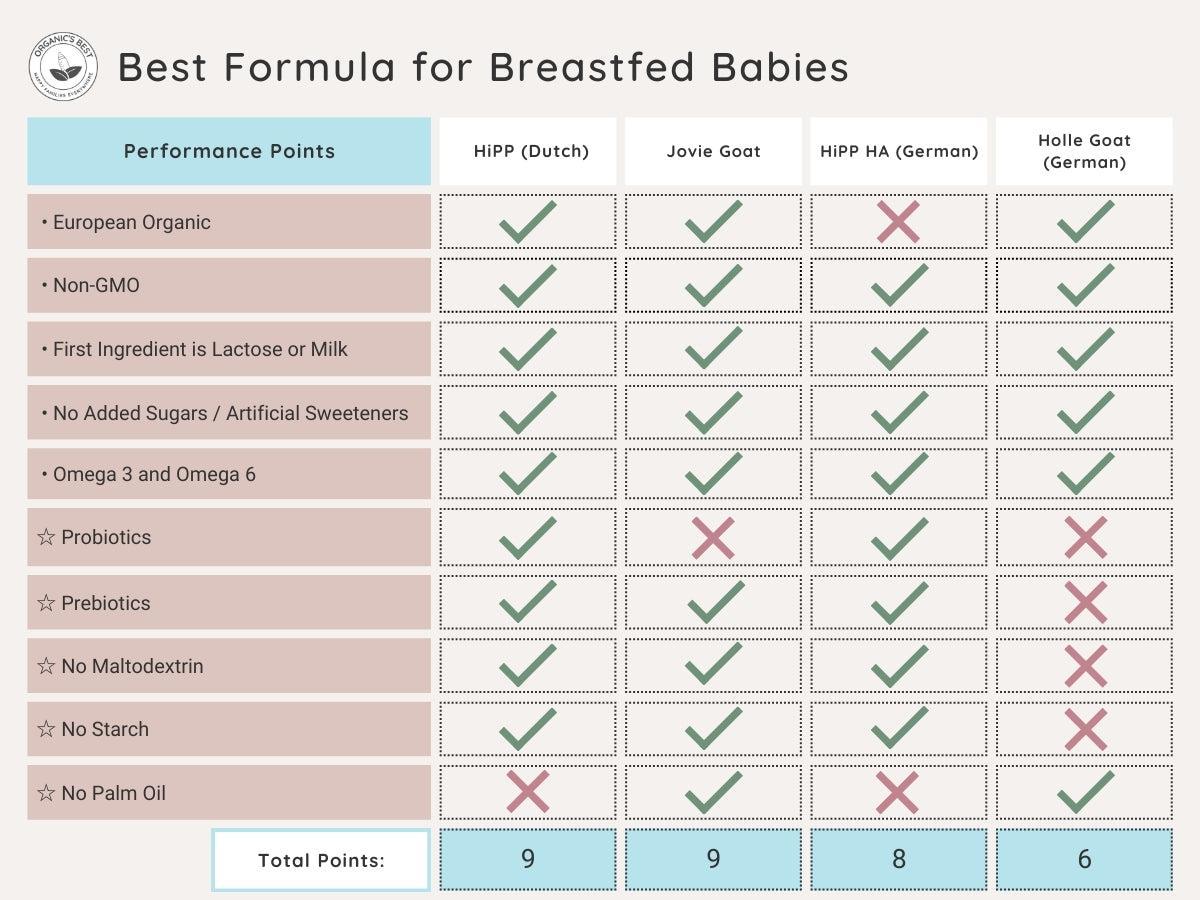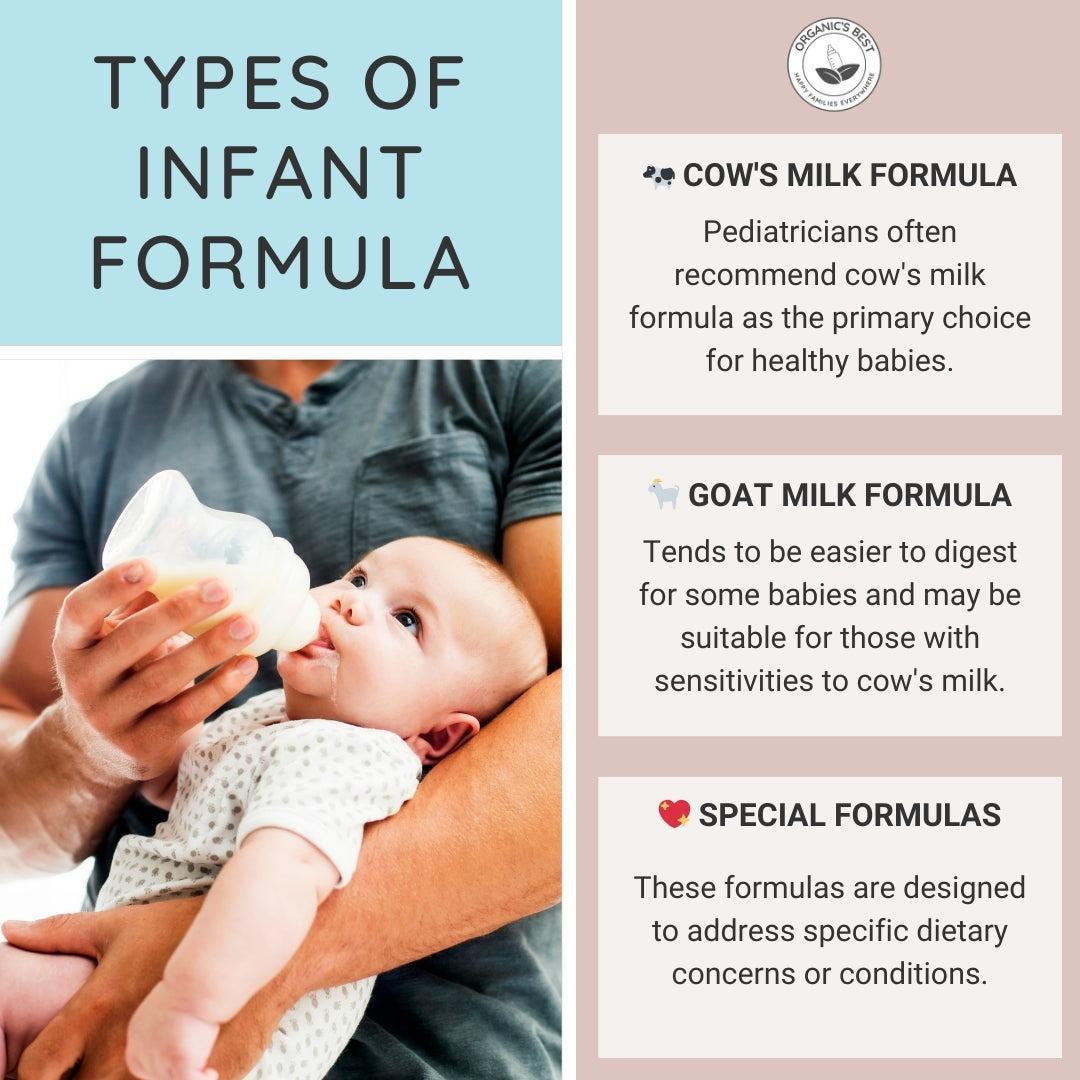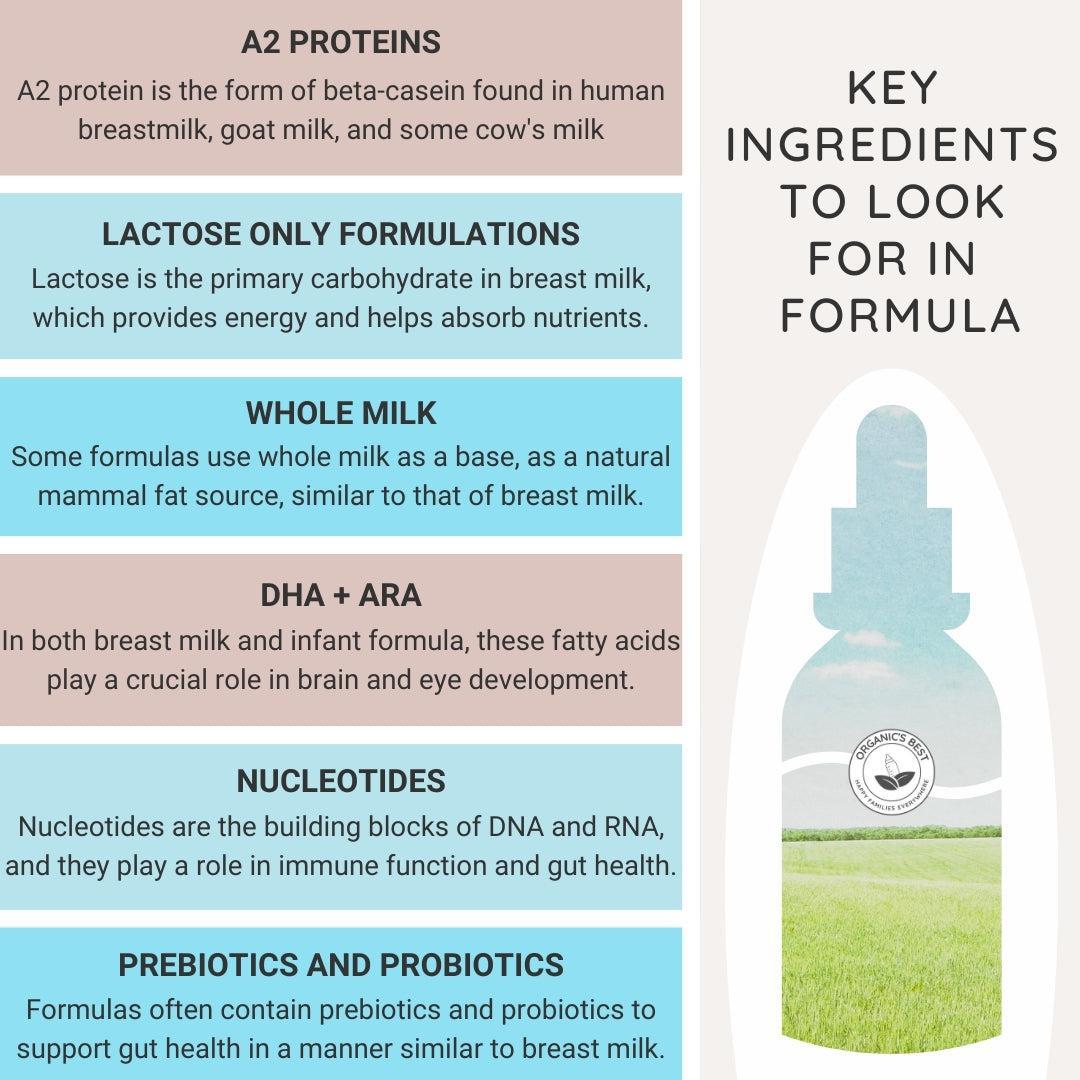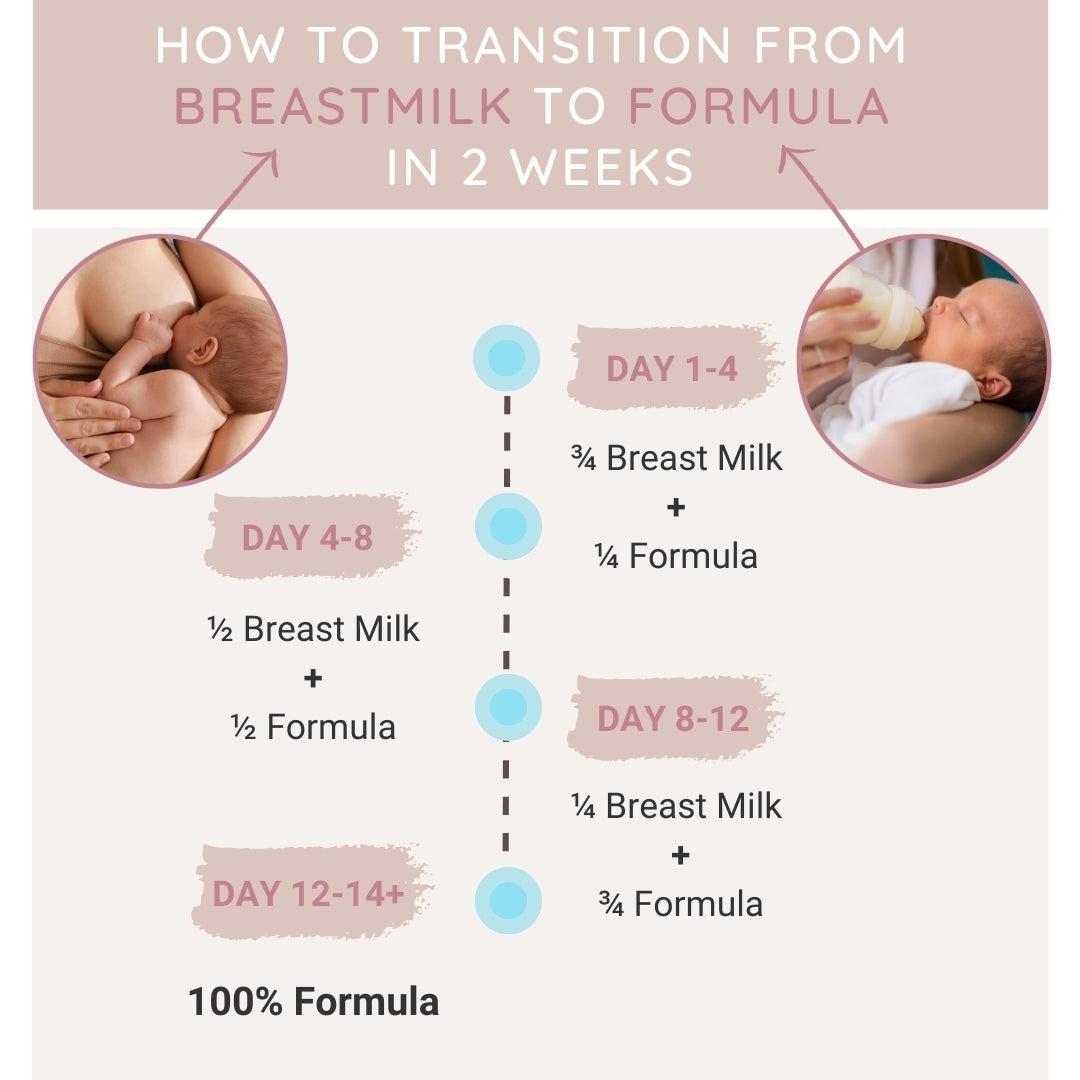Click to Get 2 FREE Boxes/Cans
Click to Get 2 FREE Boxes/Cans
Only New Customers! Click HERE to Get 2 Extra Boxes/Cans for Free With Your First Order.
Only New Customers! Click HERE to Get 2 Extra Boxes/Cans for Free With Your First Order.
BABY FORMULA
Offering new parents top-quality European infant formula from renowned brands like HiPP, Holle, Kendamil, and more. If you’re uncertain about which product to choose, our Formula Finder can help you make the best decision for your baby.
Baby Food
Offering new parents a premium selection of European baby foods, including jars, pouches, cereals, and snacks from esteemed brands like HiPP and Holle.
Best Formula for Breastfed Babies 2026 Guide
by Agustina Fernandez January 05, 2026 15 min read

Many moms strive to exclusively breastfeed their children, as this is recommended by the American Academy of Pediatrics for the first 6 months of life. However, what works for one family may not work for another.
If you have been exclusively breastfeeding thus far, then you might feel apprehensive about incorporating formula feeding into your routine. Luckily, there are many infant formulas that are crafted to mimic breast milk as closely as possible.
In this article, we will be highlighting the best formula for breastfed babies and answering some of the most frequently asked questions about how to use infant formula to supplement or replace breast milk!
Table of Contents
- Ranking The Best Baby Formulas for Breastfed Little Ones
- HiPP Dutch - Closest formula to breast milk overall
- Jovie Goat - Best formula for babies based on goat's milk
- HiPP HA German - Best hypoallergenic formula for breastfed babies
- Holle Goat (German) - Best organic formula to mix with breast milk
- Guide: How to choose a formula for breastfed babies?
- What formula is closest to breastmilk? Key ingredients to look for
- What's the best formula to supplement breastfeeding?
- Is it OK to switch to formula from breastfeeding?
- What is the best formula to transition from breast milk?
- Scientific References
Ranking The Best Baby Formulas for Breastfed Little Ones
We're here to help you on your formula-finding journey! To do so, we have spent hours researching formulas, scrutinizing scientific studies, and analyzing ingredient lists so that we can give trustworthy and reliable recommendations based on the latest scientific findings in infant nutrition. We encourage you to check out our "How We Review Page" for more info on our standards for rating each product.

To make our ranking system as comprehensive as possible, we have evaluated each baby formula based on five key criteria: European organic certification, non-GMO ingredients, lactose or milk as the primary ingredient, no added sugars or artificial sweeteners, and the inclusion of ARA & DHA.
We've also awarded bonus points for the inclusion of probiotics, prebiotics, and the absence of maltodextrin, starch, and palm oil. Each performance category is assigned 1 point for a maximum of 10 points in total.

HiPP Dutch - Closest formula to breast milk overall
Parents often ask what formula is closest to breastmilk? HiPP Dutch organic formula is a favourite amongst those seeking a 100% lactose-based, gentle formula that is as close to breast milk as it gets. This product contains a unique blend of ingredients that are helpful for reducing common digestive conditions such as colic, constipation, bloating, and gas.
Pros ✔️
-
Enriched with probiotics originally sourced from breast milk
-
All stages are free from starch and maltodextrin
-
Has an optimally balanced fatty acid profile
Cons ❌
-
Contains sustainably sourced palm oil
Leading Qualities of HiPP Dutch Baby Formula
Starting off on a positive note, we appreciate that HiPP Dutch meets the stringent standards set out by the European Commission for organic products. This ensures that the organic infant formula is free from pesticides, growth hormones, synthetic ingredients, and genetically modified organisms (GMOs).
Our review of infant nutrition literature clearly demonstrates that not all carbohydrate sources are equal, and lactose stands out as an optimal choice for your baby's nutritional needs. This distinction comes from lactose being the predominant carbohydrate in breast milk.
As far as alternatives to lactose go, studies suggest that consuming baby formula with corn syrup solids in lieu of lactose can lead to an altered gut microbiome and a heightened risk of obesity in infants. Based on this research, it's no surprise that we're trying to stay away from added sugars or artificial sweeteners, which is easily achieved with HiPP Dutch!
As an added bonus, this formula contains Metafolin® instead of folic acid, which is more easily absorbed by babies and is closer to the folate source found in breast milk. We were also happy to find that HiPP Dutch formula contains both ARA and DHA in a one to one ratio, which studies show is the most effective balance of these fatty acids for optimal health and development.
Bonus Points Awarded to HiPP Dutch ☆
In our evaluation of HiPP Dutch, we aimed to discover what sets this organic baby formula apart from other popular lactose-based products. What stood out to us was the inclusion of prebiotics derived from lactose and probiotic lactic acid cultures originally extracted from real breast milk. By including these unique ingredients, formula-fed babies can receive many of the gut-strengthening benefits of human milk!
We mentioned earlier that this formula is 100% lactose-based, meaning that it does not include any complementary carbohydrates, such as starch and maltodextrin. This is great to see because lactose is often more easily digested by healthy infants, which can minimize the risk of common digestive conditions.
We've awarded HiPP Dutch with an impressive score of 9/10, with one point being removed for the inclusion of palm oil. Although thankfully, HiPP ethically sources palm oil and uses it to attain a fatty acid spectrum closer to that of breast milk.
What Parents Say 💬
|
Jovie Goat - Best formula for babies based on goat's milk
Jovie is made by parents, for parents, and offers your baby the purest and most nutritionally complete alternative to breastfeeding. This beloved organic formula consists of gentle whole goat's milk, essential fatty acids, prebiotics, and a host of nourishing vitamins and minerals.
However, if your baby has been formally diagnosed with a CMPA or lactose intolerance, Jovie is unsuitable for your little one.
Pros ✔️
-
Nutrient-packed full-fat goat milk
-
Gentle and easy-to-digest milk proteins
-
Enriched with naturally occurring prebiotics
Cons ❌
-
Does not contain probiotics
Leading Qualities of Jovie Goat Organic Baby Formulas
We were thoroughly impressed by Jovies' use of organic ingredients, enabling the product to meet the strict standards of the EU organic certification. Jovie is also proudly non-GMO and even glyphosate residue-free!
Jovie formula is known for its easy-to-digest formulation, which includes a nourishing base of organic whole goat's milk and lactose.
Studies reveal that "goat milk proteins have several health benefits, including immunomodulatory effects, allergy management, anti‐inflammatory, and antioxidant effects, as well as antimicrobial and anticancer properties." Whole goat milk fat, in particular, helps improve calcium and fat absorption and supports digestion and bone health.
Our findings show that Jovie is an exceptionally gentle formula. One of the reasons why is the exclusion of any added sugars or artificial sweeteners, which are known to cause discomfort in some babies. This soothing formulation makes Jovie Stage 1 some of the best formula for newborns.
We also appreciate the inclusion of essential fatty acids in the form of DHA (Omega-3) & AA (Omega-6), which both play a part in immune system regulation, as well as brain and eye development. As of 2022, DHA is mandatory in European infant formulas, but research shows that "when infants receive both AA and DHA supplementation, they have better outcomes in cognitive performance than receiving DHA alone".
Bonus Points Awarded to Jovie Goat ☆
We were pleased to find that Jovie has naturally occurring prebiotics from lactose, which serve as food for beneficial bacteria residing in the gut, but unfortunately, you won't find any probiotics in this recipe.
To achieve a gentle formulation, Jovie does not contain any starch or maltodextrin. It is also free from palm oil; while it is approved for use in baby formulas, there are some concerns linked to calcium absorption and constipation in infants. All in all, Jovie tied with HiPP Dutch for first place with an impressive 9/10 points.
What Parents Say 💬"I had to start supplementing due to a decrease in my milk supply. While doing my research, I came across this website that had some great information on organic formulas. I also found the brand Jovie, which, oddly enough, is my 4-month-old daughter’s name. I decided to give it a try. Approximately two weeks in, and she loves it! Bowel movements have been good and very minimal spit ups. I will continue purchasing this brand." |
HiPP HA German - Best hypoallergenic formula for breastfed babies
HiPP HA has been impressively developed with knowledge gained from over 25 years of immunology research. The result is a product that boasts an impressive nutritional profile while minimizing the risk of allergic reactions in babies with milk protein sensitivities. To help protect against unwanted allergic reactions, HiPP HA includes gut health-supporting ingredients such as hydrolyzed whey protein, prebiotics, and probiotics.
Please consult your pediatrician to see if this formula is a good match for your baby, as HiPP HA may not be suitable for babies with cow's milk protein allergy (CMPA).
Pros ✔️
-
Digestible low-allergen hydrolyzed proteins
-
Immune-supporting probiotics & prebiotics
-
Probiotic lactic acid cultures originally extracted from breast milk
Cons ❌
-
Contains sustainably sourced palm oil
-
Not certified organic
Leading Qualities of HiPP HA Infant Formula
An interesting fact to note is that several hypoallergenic formulas lack European organic certification. This is due to regulations stipulating that formulas containing hydrolyzed milk protein, like HiPP HA, cannot be certified as organic. Nevertheless, this does not compromise the quality of HiPP HA, which remains free from genetically modified organisms (GMOs).
We appreciate the use of lactose as the sole carbohydrate source in HiPP HA formula. This choice ensures a readily digestible source of energy closely mirroring the primary carbohydrate found in breast milk. Additionally, lactose gives this formula a mild taste that can be compared to human milk.
Just like breast milk wouldn't contain any added sugars or artificial sweeteners like corn syrup, neither does HiPP HA. We encourage parents to opt for infant formulas that only contain natural sugars to set their children up for nutrition success.
Bonus Points Awarded to HiPP HA ☆
Similar to other HiPP products, this extensively hydrolyzed baby formula contains a blend of prebiotics and probiotics from real breast milk. This gut-supporting combo helps to fortify your baby's intestinal wall and protect against allergens and unwanted bacteria!
Since HiPP HA infant formula is made to be extra gentle, it is free from additives like starch, maltodextrin, and corn syrup. By omitting these ingredients, this simple formulation can potentially aid in relieving problems such as colic, constipation, bloating, and gas for many babies, and for this reason, we are awarding it two bonus points.
For similar reasons to HiPP Dutch baby formula, we've withheld one point from HiPP HA due to the inclusion of palm oil. Despite this loss, HiPP HA is awarded with an impressive ranking of 8/10.
What Parents Say 💬"A perfect supplement while exclusively pumping for our son. He wasn’t gaining weight well, and he needed a hypoallergenic formula. I knew I wanted the best formula option. I had researched formula extensively before choosing HIPP HA. He’s been on it for 4 months now, and he is thriving." |
Holle Goat (German) - Best organic formula to mix with breast milk
Holle offers a top-of-the-line goat milk formula, made with a short ingredient list of naturally gentle A2 goat milk, lactose, vegetable oils, and a carefully chosen selection of health-boosting vitamins and minerals. This gentle baby formula may be beneficial for infants whose tummies aren't too fond of cow's milk.
However, if your baby has been formally diagnosed with a CMPA or lactose intolerance, Holle Goat is unsuitable for your little one.
Pros ✔️
-
EU organic and Demeter biodynamic
-
Short ingredient list
-
Formulated with easy-to-digest A2 goat milk protein
Cons ❌
-
Does not contain probiotics or prebiotics
-
Contains maltodextrin from Stage 1
-
Contains starch from Stage 2
Leading Qualities of Holle Goat
Just like our organic formulas from Jovie and HiPP Dutch, we were impressed with how Holle Goat aligns with European organic standards, which also guarantee the absence of GMOs. Plus, Holle Goat Stages PRE to 3 also hold the Demeter label — the strictest organic certification globally!
We also appreciate the unique structure of this formula, which includes a base of organic goat's milk. Goat milk boasts a composition more similar to breast milk as it contains A2 beta-casein protein, as opposed to cow's milk, which consists of Alpha S1 Casein milk protein. A2 goat milk protein is composed of smaller fat molecules and less lactose for easier digestion, which means that Holle Goat is especially gentle on tiny tummies.
All infant formulas contain sugar because it is essential for a baby's growth and development, but there are formulas, like Holle Goat, that are made without added sugars. Holle is also packed full of nutrients like essential fatty acids DHA and ARA.
Bonus Points Awarded to Holle Goat ☆
While we applaud Holle for providing infants with simple nutrition by ensuring that their products have a short, clean list of ingredients, due to the parameters of our testing, we've removed two points for choosing not to add prebiotics and probiotics.
In the starch and maltodextrin department, we've noticed that this infant formula varies quite a lot depending on the stage. We've withheld two points for including maltodextrin in Stage 1 and both maltodextrin and starch in Stages 2-4. However, we appreciate that Stage PRE is free from both! Holle Goat is also free from palm oil, which gives this formula a final ranking of 6/10.
What Parents Say 💬
|
Guide: How to Choose a Formula for Breastfed Babies?
If you have been scouring the organic baby formula market looking for the best organic baby formula for supplements while breastfeeding or to transition from breast milk, there are a few factors to consider:
1) Type of Formula
Firstly, you should consider what milk is best for your baby's unique needs. Keep in mind that the formulas described below may also come in multiple varieties, including powdered formula, concentrated liquid formula, and ready-to-feed formula.

-
Cow's Milk Formula: Pediatricians often recommend cow's milk formula as the primary choice for healthy babies.
-
Goat Milk Formula: Goat milk is a gentler alternative to cow's milk formula as it tends to be easier to digest and may benefit those with sensitivities to cow's milk.
-
Special Formulas: Special formulas (hypoallergenic, comfort, anti-reflux, soy formula, or rice-based formulas) should only be used under the recommendation and supervision of a pediatrician. These formulas are designed to address specific dietary concerns or conditions.
2) Age Range
European baby formulas come in a variety of stages, which are tailored to infants' developmental milestones, ranging from newborn to toddler stages. Make sure that you are choosing a product suitable for your baby's age.
3) Price
Your budget plays a significant role in determining the formula you choose for your baby. Fortunately, our products come in a variety of price ranges to accommodate different financial situations.
As a special incentive, all first-time customers qualify for two free boxes or cans of formula when purchasing 12 or more formula containers from us. Plus, we offer bulk order discounts starting from orders of 6 formulas for all our customers. This means you can save more money with every additional box or can of formula you purchase!
4) Brand Reputation
Our brands are known for their commitment to quality, safety, and adherence to strict regulatory standards. We understand the importance of trust when it comes to feeding your baby, which is why we prioritize transparency in our products.
What formula is closest to breastmilk? Key ingredients to look for
While no formula can replicate breast milk entirely, there are key ingredients to look for that can enhance the similarity between formula and breast milk.

1) A2 Milk Proteins
A2 milk proteins are naturally found in human, goat, as well as some – but not all – cows' milk. Not all infant formulas contain A2 proteins, but you will find them in goat's milk formulas, as well as Holle's A2 cow's milk formula.
2) Lactose-Only Formulations
Lactose is the primary carbohydrate in breast milk, providing energy and aiding in the absorption of essential nutrients. Therefore, formulas that contain lactose as the sole carbohydrate source closely resemble breast milk in this aspect.
3) Whole Milk
Some formulas use whole milk as a natural fat source, similar to that of breast milk. This typically means that the formula will contain fewer vegetable oils, which are typically added to formulas to replace fats removed from skim milk.
4) DHA and ARA
Docosahexaenoic acid (DHA) and arachidonic acid (ARA) are omega-3 and 6 fatty acids found in breast milk. In both breast milk and infant formula, these fatty acids play a crucial role in brain and eye development.
5) Nucleotides
Nucleotides are the building blocks of DNA and RNA, and they play a role in immune function and gut health. While breast milk naturally contains nucleotides, some formulas are supplemented with nucleotides to mimic this aspect of breast milk composition.
6) Prebiotics and probiotics
Formulas often contain prebiotics and probiotics to support gut health in a manner similar to breast milk, but the specific strains and concentrations may vary. Some formulas, like those from HiPP, contain probiotic lactic acid cultures originally extracted from real breast milk.
What's the Best Formula to Supplement Breastfeeding?
Any of the formulas mentioned on our list today make a great choice for supplementing while breastfeeding due to their similarity to breast milk. But before incorporating them into your little one's diet, make sure to get approval from your baby's pediatrician.
Keep in mind that the ideal option for your little one is exclusive breastfeeding for the first 6 months and then trying to maintain partial breastfeeding alongside complementary feeding from 6 months up until your child turns 2.
However, if breastfeeding is not working out due to medical, lifestyle, or supply issues, know that you're not alone, and you have options!
Once you've gotten the go-ahead from your baby's pediatrician to begin with a certain formula, here are some tips to guide you toward successful combination feeding!
Tips for Supplementing With Formula
-
If you're using formula because you're not producing enough milk to breastfeed exclusively, it's best to offer your baby any pumped milk you have first and then make up the difference with formula as needed.
-
Your milk supply will naturally decrease once your nursing session decreases. If you wish to maintain your milk supply, it is recommended to pump frequently.
-
If your baby is accustomed to breastfeeding, they will associate mom with milk. So, when you first introduce bottle feeding, it can be beneficial to begin by getting someone else, such as a partner or caregiver, to give your little one their bottles to increase their chance of acceptance.
Is it OK to Switch to Formula from Breastfeeding?
The short answer to this question is yes; supplementing with infant formula is extremely common and a safe alternative to breastfeeding. Formula-fed babies can receive the nutrients they need through formula. This is a deeply personal choice, and the health of the mother and baby is a top priority.
What is the Best Formula to Transition from Breast Milk?
The best formula for your baby will be pediatrician-approved, satisfying their unique nutritional needs, and be something your little one tolerates well. We encourage parents looking to make the switch to formula feeding to explore the options we've presented today.
Tips for Transitioning From Breast Milk to Formula
It usually takes around 2 weeks to fully transition to formula feeding; during this time, baby formula is mixed with breast milk in one bottle, and the amount of formula is gradually increased over time in the correct ratio as described below!

-
¾ breast milk to ¼ formula for days 1-4
-
½ breast milk to ½ formula for days 4-8
-
¼ breast milk to ¾ formula for the next 4-5 days (in some cases, it might take up to 1 week)
-
Finally, 100% baby formula
Conclusion: What is the best formula for breastfed babies?
All the formula brands mentioned above have made successful efforts to replicate many of the qualities and benefits found in breast milk. While our assessment has determined that HiPP Dutch and Jovie Goat come out on top as the best baby formula, due to slight ingredient variations, some products may be better suited to your child's needs over others.
Before switching to infant formula, we encourage you to speak with a pediatrician for personalized advice and guidance. Additionally, if you intend to pursue breastfeeding further, a lactation consultant can offer invaluable support and assistance on your journey!
Scientific References
-
ALKaisy, Q. H., Al-Saadi, J. M. S., Al-Rikabi, A. K., Altemimi, A. B., Hesarinejad, M. A., & Abedelmaksoud, T. G. (2023b). Exploring the health benefits and functional properties of goat milk proteins. Food Science and Nutrition, 11(10), 5641–5656.
-
Anderson, C., Whaley, S. E., & Goran, M. I. (2022). Lactose-reduced infant formula with corn syrup solids and obesity risk among participants in the Special Supplemental Nutrition Program for Women, Infants, and Children (WIC). The American Journal of Clinical Nutrition, 116(4), 1002–1009.
-
Dancey, C. P., Attree, E. A., & Brown, K. (2006). Nucleotide supplementation: a randomised double-blind placebo controlled trial of IntestAidIB in people with Irritable Bowel Syndrome [ISRCTN67764449]. Nutrition Journal, 5(1).
-
Hopperton, K. E., Pitino, M. A., Walton, K., Kiss, A., Unger, S., O’Connor, D. L., & Bazinet, R. P. (2022). Docosahexaenoic acid and arachidonic acid levels are correlated in human milk: Implications for new European infant formula regulations. Lipids, 57(3), 197–202.
-
Kong, K. L., Burgess, B., Morris, K. S., Re, T., Hull, H. R., Sullivan, D. K., & Paluch, R. A. (2021). Association Between Added Sugars from Infant Formulas and Rapid Weight Gain in US Infants and Toddlers. The Journal of Nutrition, 151(6), 1572–1580.
-
Lorenzo, I., Tonato, A. C., De La Garza Puentes, A., Nieto, A., Herrmann, F., Diéguez, E., Castellote, A. I., López-Sabater, M. C., Rodrı́guez-Palmero, M., & Campoy, C. (2019). The Effect of an Infant Formula Supplemented with AA and DHA on Fatty Acid Levels of Infants with Different FADS Genotypes: The COGNIS Study. Nutrients, 11(3), 602.
-
Salem, N., & Van Dael, P. (2020). Arachidonic acid in human milk. Nutrients, 12(3), 626.
Disclaimer:
Please be aware that this information is based on general trends in babies, and it is not medical advice. Your doctor should be your first source of information and advice when considering any changes to your child’s formula and when choosing your child’s formula. Always consult your pediatrician before making any decisions about your child’s diet or if you notice any changes in your child. Breastfeeding is the best nutrition for your baby because breast milk provides your child with all the essential nutrients they need for growth and development. Please consult your pediatrician if your child requires supplemental feeding. |
Agustina Fernandez
Dr. Agustina Fernandez earned her medical degree from the prestigious Universidad Nacional de Córdoba, Argentina. With a deep-rooted passion for pediatrics, Dr. Fernandez is currently on the path to specializing in children's healthcare. Recently, she has delved into the vital field of infant nutrition. Her research interests include breastfeeding, infant formula, and baby food in little ones’ formative years. Dr. Fernandez's commitment to this area of study underscores her dedication to ensuring the health and well-being of children from their earliest days.
2 Responses
Nashila Virji
March 27, 2023
I understand European baby formulas have stricter guidelines than the US. So why is palm oil included in the ingredients? I believe it is not a good ingredient.
Thanking you,
Nashila
Leave a comment
Comments will be approved before showing up.
Also in Organic Infant Nutrition and Health Blog

European Baby Formula Stages: What New Parents Need to Know
by Agustina Fernandez February 18, 2026 12 min read
Read More
Infant Feeding Guide for New Dads: Bottle Feeding Tips
by Agustina Fernandez February 10, 2026 10 min read
Read More
Spilled Milk: Feeding Unfiltered with Hayley
by Agustina Fernandez February 04, 2026 4 min read
Read More
Reviewed by Dr. Po-Chang Hsu, MD, MS
-

Dr. Po-Chang Hsu: Medical Reviewer of Organic's Best Blog
Dr. Hsu received his medical degree from Tufts University in Boston, Massachusetts, and holds a Master’s of Science degree from both Harvard University and Tufts University.





Organic's Best Shop
March 27, 2023
Hi Nashila,
Thank you so much for your comment! Palm oil is an ingredient that can bring up a lot of strong feelings as it’s widely used by food manufacturers in environmentally damaging ways. However, not all palm oil is the same, and there is a way to use this ingredient responsibly.
First, we’d like to explain why palm oil is valuable to infant nutrition. Palm oil is a natural source of palmitic acid, an abundant component in breast milk. Thus, palm oil is added to baby formula to reflect the fatty acid profile of breast milk and achieve comparable levels of palmitic acid.
Our two most popular brands, HiPP and Holle, use organic sustainability-sourced palm oil in their products. However, Holle also offers palm oil-free options like their goat milk-based formulas. Lowenzahn Organics, a leading German formula brand we carry, also uses organic RSPO-certified palm oil in their formula.
If you prefer milk without palm oil, we recommend choosing a formula based on whole milk powder or goat’s milk. Both options contain naturally high levels of palmitic acid, so adding palm oil can often be avoided. Our palm oil-free options include all stages of Jovie, Premibio Premichevre goat’s milk formula, and Holle’s goat’s milk-based formulas.
We hope that helps clear things up for you :)